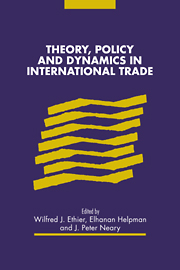Book contents
- Frontmatter
- Contents
- List of conference participants
- I Introduction
- II History, geography and the theory of trade
- III The structure of simple trade models
- IV Policy towards international trade
- 9 Welfare effects of tariffs and investment taxes
- 10 The case of the vanishing revenues: auction quotas with oligopoly
- V Trade, growth and dynamics
- Index
10 - The case of the vanishing revenues: auction quotas with oligopoly
Published online by Cambridge University Press: 16 March 2010
- Frontmatter
- Contents
- List of conference participants
- I Introduction
- II History, geography and the theory of trade
- III The structure of simple trade models
- IV Policy towards international trade
- 9 Welfare effects of tariffs and investment taxes
- 10 The case of the vanishing revenues: auction quotas with oligopoly
- V Trade, growth and dynamics
- Index
Summary
Introduction
One of the most common criticisms of voluntary export restrictions (VERs) and the way that quotas are currently allocated is that they allow foreigners to reap the rents associated with the quantitative constraints. It has been suggested that auctioning import quotas would remedy this. However, it is by now well understood that this policy may not raise significant revenues in the presence of market power on the part of producers. The reason is that in such environments, prices are chosen by producers, i.e. there is no supply curve and the response of producers to the constraint must be taken into account when determining the price of an auctioned license. For example, foreign producers can reduce the value of a license by raising their own price. Since this allows them to appropriate potential rents, they do so. This leads to low prices for licenses in equilibrium.
Krishna (1990a), Takacs (1987), and Helpman and Krugman (1989) analyze the response of producers to quotas, and the effects of this on license prices. Krishna considers a foreign monopolist who has other markets, while Takacs focuses on a single market. Helpman and Krugman look at foreign oligopoly. They use perceived marginal revenue and marginal cost tools applied to a model of price competition to argue that the license price is zero unless the quota is quite restrictive. They then work out a linear demand, foreign duopoly model with price competition and differentiated products. For this model they show that welfare, even when the quota is set optimally and licenses are auctioned, is below that under free trade.
- Type
- Chapter
- Information
- Theory, Policy and Dynamics in International Trade , pp. 157 - 172Publisher: Cambridge University PressPrint publication year: 1993
- 2
- Cited by



